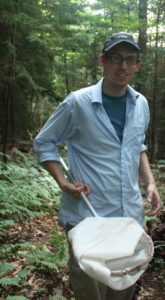Dr. Vince Martinson, a post-doc in the Jaenike Lab, is presenting an EEB seminar entitled “The gut microbiota of bees and wild drosophilids.” Vince completed his Ph.D. at the University of Arizona under Nancy Moran, where his research centered on the gut bacteria of honey bees.
Journal Club 10/5
Next week we’ll be reading the following papers about phenotypic plasticity and ecological interactions:
P.G. Kraft, C.E. Franklin, M.W. Blows(2006) Predator induced phenotypic plasticity in tadpoles: extension or innovation? J Exp Biol 19:450–458
EEB Seminar, Friday, November 1: “Population genetics of adaptation in species with separate sexes”
 Dr. James Fry will be hosting Dr. Timothy Connallon’s visit on Friday, November 1. Dr. Connallon is a Postdoctoral Fellow in the Department of Molecular Biology and Genetics at Cornell University. He is presenting a talk titled, “Population genetics of adaptation in species with separate sexes.”
Dr. James Fry will be hosting Dr. Timothy Connallon’s visit on Friday, November 1. Dr. Connallon is a Postdoctoral Fellow in the Department of Molecular Biology and Genetics at Cornell University. He is presenting a talk titled, “Population genetics of adaptation in species with separate sexes.”
Dr. Connallon completed his Ph.D. in the lab of Dr. Lacey Knowles at the University of Michigan, where he studied the evolutionary consequences of X-linked inheritance and sex-specific natural and sexual selection in fruit flies. Since joining the Clark lab at Cornell in September 2009, Tim has been working to develop theoretical models of adaptation on the X and Y-chromosomes, and autosomes, with the specific goal of generating predictions to be tested using comparative genomics and gene expression data.
Journal Club
Next week will be reading the following papers for Journal Club
The loci of evolution: how predictatble is genetic evolution
Population genetics, pleiotropy, and the preferential fixation of mutations during adaptive evolution
Party for Kathy
EEB Seminar, Friday, October 25: “Sexual selection, condition-dependence and adaptation (in Drosophila)”
Dr. Daven Presgraves is host to Dr. Howard Rundle, Associate Professor in the Department of Biology at the University of Ottawa. He is presenting a talk titled, “Sexual selection, condition-dependence and adaptation (in Drosophila).” Please see below for information on his research:
“While I am interested in diverse topics in evolutionary ecology, the main focus of research in my lab currently addresses how natural and sexual selection interact during adaptation, and how both processes contribute to phenotypic divergence and speciation. Addressing such questions requires a comprehensive understanding of how sexual selection operates within populations and how it varies in different environments (e.g., social, geographical, natural). Our approach is primarily empirical and utilizes experimental evolution and behavioral assays to conduct manipulative, direct tests of various key evolutionary hypotheses. Because the majority of sexual selection theory has quantitative genetic foundations, much of our work is also conducted within a quantitative genetic framework.”
Journal Club Oct. 22
Next week we will be discussing epigenetics and phenotypic plasticity.
See you then!
Kucharski R., Maleszka J., Foret S. & Maleszka R. 2008. Nutritional control of reproductive status in honeybees via DNA methylation. Science 319: 1827-1830.
Richards C.L., Bossdorf O. & Pigliucci M. 2010. What Role Does Heritable Epigenetic Variation Play in Phenotypic Evolution? BioScience 60: 232-237.
Please Note: THERE WILL BE NO EEB SEMINAR ON October 18th
TGIF tomorrow
Journal Club October 15th
Next week in Journal Club we will discuss molecular mechanisms underlying plasticity. See everyone there!
Anstey M.L., Rogers S.M., Ott S.R., Burrows M. & Simpson S.J. 2009. Serotonin mediates
behavioral gregarization underlying swarm formation in desert locusts. Science 323:
627-630.
Kijimoto T., Moczek A.P. & Andrews J. 2012. Diversification of doublesex function underlies
morph-, sex-, and species-specific development of beetle horns. PNAS. 109: 20526-
20531.





